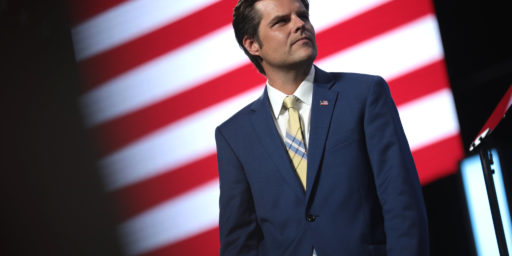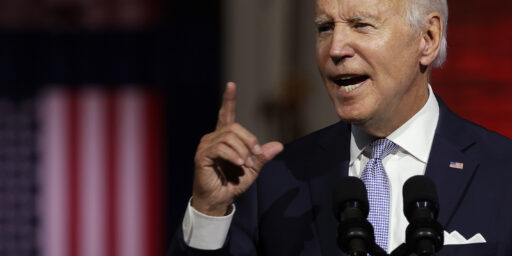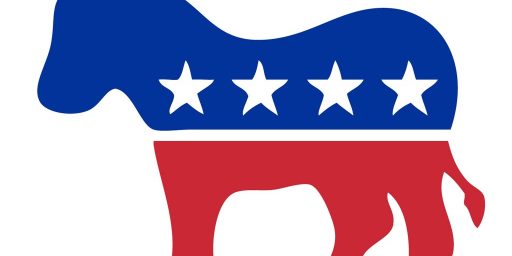Poll: Public Likes Democrats Less than Republicans
A new poll for NPR reveals that a majority simultaneously disapprove of President Bush’s handling of the economy and thinks their own economic situation is fine. More interestingly, even though President Bush and the Republicans have very poor approval ratings, the Democrats are doing even worse.
Poll Finds Public of Two Minds on Economy (NPR)
We asked our two pollsters, Democrat Stan Greenberg and Republican Glen Bolger,* to take a look at how the economy was perceived by likely voters; and how those perceptions may affect fortunes at the ballot box 15 months from now.
The survey shows that a majority of likely voters are unhappy with the economy. Only 43 percent of respondents approved of the way President Bush was handling the economy; 53 percent disapproved. Yet when asked about their personal economic well being, respondents were more positive. “We asked them, ‘How about your economic situation?’ and the numbers virtually flipped,” Bolger said.
The survey also asked respondents to rate the political parties overall. Our pollsters asked voters to rate their feelings on a thermometer; with one meaning cold and unfavorable, 100 meaning very warm and favorable. The Democratic Party scored slightly lower than the Republican Party, and several points lower than President Bush. “The fact is, the Democrats are viewed less favorably right now, at a time when Republicans aren’t very popular, when the president’s not very popular,” pollster Greenberg said. He called any Democratic advantage derived from the perception of a weak economy “theoretical.”
The diverging numbers on the economy are not at all uncommon. People generally feel much better about their own economic situation than they do about the economy in general since 1) most people have a job, even during recessions; 2) the news and politicians tend to emphasize the negative.
The Democrat/Republican numbers are more interesting. Partly, I think, they reflect the bifurcated nature of our politics that has existed since the 2000 election cycle, if not the Clinton-Lewinsky scandal. The public hates acrimony in politics and desperately want both sides to “get along and do what’s right for the country,” as simplistic as that may be.
The party numbers are even more odd when one looks inside the poll and sees that more people in the same survey say they would vote for the Democrat in the 2006 congressional elections were held today (which, I hasten to add, they will not be). So, they feel “cooler” toward the Democrats but still say they are more likely to vote for them in a generic race.
Complete poll results, in PDF format, are available here
*Full disclosure: Bolger is Managing Partner of Public Opinion Strategies, which employs the Fiancé.






Well it reflects the press tendency to emphasize negative economic statistical news (or spin positive news negatively) during a Republican administration and spin it positively during a Democratic administration. The reality is that we have an economy where the vast majority of people who want a job are employed, so they feel good about their situation, but then they hear the press spin economic news negatively and low and behold they think things are bad for everyone else.
I think part of the problem is that the Republicans have exercised much stronger control, aided by various factors, over their popular perception. Love ’em or hate ’em, people feel that they know who the Repubs are, & it’s largely who the Repubs want to be known as.
Whereas the Dems have let their image be created by the Republicans, and that is the image that most people have in their minds: liberal, tax & spend, gun-bashing, etc.
Years ago the Repubs started taking all this seriously & became great campaigners as a result. The Dems keep rehiring the same failed guys (Shrum! aieee!) and keep having the same problems.
Bill Clinton’s greatest failure as a president may’ve been his failure to capitalize on his achievements (there were some, people, take the wingnut hat off for a second) and rebrand the Dems. Of course, his failure to keep his dick in his pants was a contributing factor ….
Anderson:
Yes and no.
On the one hand, the GOP has shown that it can learn from the Dems. Thus, whereas once grassroots organizing was a Dem specialty, in recent elections (not least in ’04), the GOP has shown that it can field ground troops w/ the best of the Dems (something Howard Dean has noted).
In terms of fund-raising the small amounts, again, the GOP has done well enough that now a majority of its donations (at the national level) seem to be in the $300 range and below.
On the other hand, to suggest that the Dems are the victims of the GOP is just plain silly.
Look, are Dems liberals or not? If they are, then it is not the GOP that determined that label, it is that Dems seem to be of two minds on where they stand on it.
Similarly, are you really going to claim that the Democratic Party is not anti-gun? Remind me again, which side of the fence does “Handgun Control, Inc.” support? Which party stood for the assault weapons ban?
Finally, while Bill had a number of achievements, many were made in spite of, not because of, the Democratic Party as a whole.
Take NAFTA. One heckuva achievement—but does the Democratic Party stand behind that one? How can it, when a goodly portion of its membership (including its union base) opposed it?
Welfare reform? The one topic that actually led to Administration members to resign their posts—again, not exactly the sort of thing that the Dems are likely to trumpet, not when so many were on record as saying that children would be left impoverished (and only about 100 voted in support of it).
So, if Bill failed to rebrand, it was in no small part because the Democratic Party bucked the new brand (and still does).
Republicans CONTROL popular perception? Not very well apparently. If you believe that they have formed the Democrats’ image, you prove my point. One needs to only look as far as Dean, Kennedy, Reid, Pelosi, Boxer for a whole boatload of venomous trash. Exactly the thing the American people are tired of hearing.
L.O., good reply.
(1) It’s not so much “are Dems liberal?” as “what’s a liberal?”, and the Repubs have totally redefined that word.
(2) The Dem *Party* supports some gun control, but then, so do the policemen’s union, etc. Lots of Dem politicians are much more loose on the gun issue. As with the Repubs, the Dems’ platform is much more extreme than the actual pols.
(3) What you say on Clinton, but he bears a lot of the onus for not doing enough to reinvent the Dems. For whatever reasons, the “curia,” if you will, of the Dem Party resisted reform successfully, a fact not altogether unconnected from the nomination of a Massachusetts Liberal in 2004.
‘Whereas the Dems have let their image be created by the Republicans,’
I’m in the yes and no group on this. It’s very tough for the Dems to keep their coalition of diverse and often opposing interests together. Whereas in the past there tended to be more common cause between the union, ethnic and social liberals now for different reasons the social liberals (for lack of a better term) have much more power within the party and certainly seem less compromising. Clinton was able to keep these factions together and win two general elections but I think he realized that he couldn’t alientate the liberal base and do this. The way he could do this was by presenting a much more mainstream face for the party but with an understanding within the liberal base that when push came to shove he would adhere to the PFTAW agenda on partial birth abortions and affirmative action and any other issue. As was evident in the ’04 election cycle centrist Dems no longer have any chance of party support nationally. I don’t believe Clinton or anyone else could rebrand the Dems because there doesn’t appear to be a way to swing the party to the center and hold the coalition together. I think HRC will attempt to use the same strategy and her own personal appeal and may be successful in running for president but I don’t think she’ll change the general party trend to the left. To the extent that the GOP portrays the Dems as ‘liberal, tax & spend, gun-bashing, etc.’ you’ve got to admit, they’ve got a lot of material to work with.
Prior to the 2000 election, I would consider voting for a Democrat, After seeing and following closely how the Democrats tried to steal the election from the voting public, I vowed never to vote or even consider a Democrat.
As I continue to follow politics on a steady basis and hearing the likes of Gore, Kerry, Dean Polosi, Durbin Lahey and the rest of the following democrat sheep, spew their anti American hate with lies and hate, I now know my anti democrat vow was correct.
To the extent that the GOP portrays the Dems as ‘liberal, tax & spend, gun-bashing, etc.’ you’ve got to admit, they’ve got a lot of material to work with.
The irony of course is that the Repubs are governing more like centrist Dems than like Republicans. Admittedly, they have edited “tax & spend” to read just “spend,” but as the deficit shows, that is not such an improvement.
Because Republicans (the party in power) spend like the Democrats (the previous party in power), therefore there is no difference, Anderson?
I notice that on guns, you rapidly shift the goalposts from the Democratic Party to individual Democrats. Well, there are still Democrats from southern states (although fewer and fewer). And the Party has concluded that yelling “We want gun control” doesn’t do ’em much good.
But are you about to claim that the GOP stands for gun control, or is it that the Dem Party doesn’t actually mean anything when they support it?
And what of cutting taxes, the other side of spending cuts?
What of reducing regulations?
What of a strong defense? I notice that Cynthia McKinney is now railing that we spend too much on defense. And this in the middle of a war.
Free trade? (As I noted, Bill stood for that, but hardly brought the rest of the party w/ him.)